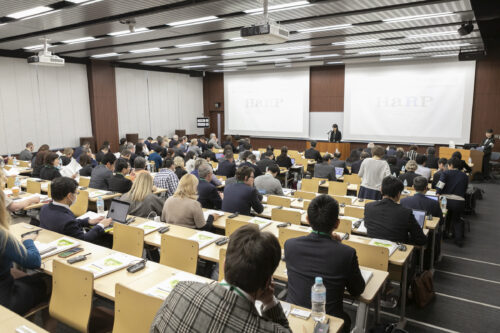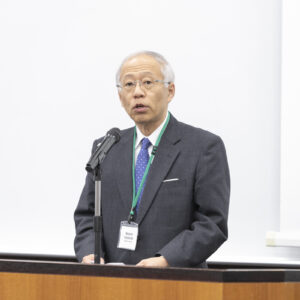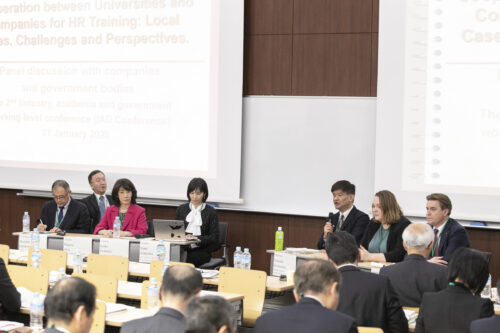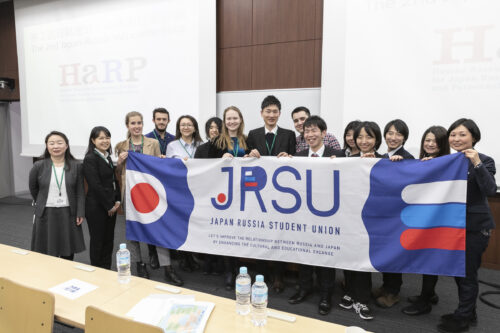
Hokkaido University held the Second Japan-Russia Industry, Academia and Government Working-level Conference at the University of Tsukuba’s Tokyo Campus on January 31 (Fri.) with the cooperation of Niigata University.

This conference is part of the 2017 MEXT Inter-University Exchange Project – Support for the Formation of Collaborative Programs with Russian Universities (Type B: Project that establishes an information platform for Japanese universities) (HaRP Project), for which Hokkaido University and Niigata University successfully applied. At the first conference last year, approximately 100 representatives of the industry, government and academia involved in exchanges between Japan and Russia gathered together to share information and exchange opinions with the aim of developing and promoting collaboration between Japan and Russia. This second conference was attended by approximately 160 participants far exceeding the last year’s number, from universities involved in Japan-Russia collaboration (19 Japanese universities and 30 Russian universities), as well as the Ministry of Education, Culture, Sports, Science and Technology, the Ministry of Economy, Trade and Industry, companies and organizations (29 institutions and organizations).
The first part of the conference, which was a debriefing session on the activities of universities adopted for the Inter-University Exchange Project, began with addresses by Masanori Kasahara, Director and Vice President of Hokkaido University, and Michi Yoshioka, Deputy director of the Office for International Planning, Higher Education Bureau, Ministry of Education, Culture, Sports, Science and Technology. Following, eight universities outlined seven projects adopted for the 2017 Inter-University Exchange Project (Russia) the results and issues of the past activities and answered questions. The Japan-Russia Committee for Personnel Exchanges under the Association of Japanese and Russian Universities and the Japan-Russia Student Union, which offers Japan-Russia collaboration on the student’s point of view, also presented their activities, allowing the audience to learn about the efforts of the HaRP Project for exchanges between Japan and Russia.

The second part of the conference, the plenary meeting, started with addresses by Kiyomi Miyagawa, Principal Deputy Director of Japan-Russia Economic Affairs Division / Japan-Russia Exchange Programs Division, European Affairs Bureau, Ministry of Foreign Affairs, Masanori Tsuruda, Director of the Europe Division, Ministry of Economy, Trade and Industry, Igor Titov, Counselor of the Embassy of the Russian Federation to Japan and Representative of the Russian Federation Exchange Agency to Japan, and Pyotr Pavlenko, Chief Delegate of the Trade Representation of the Russian Federation in Japan.
Then, the Japan Association for Trade with Russia & NIS (ROTOBO) and the Japan External Trade Organization (JETRO) made presentations on Japan-Russia economic cooperation and efforts to recruit foreign human resources. After that, Tsuyoshi Setoguchi, Dean of the Faculty of Engineering, Hokkaido University, provided general information on regional industry-government-academia collaboration in specialized sections in academic 2019. In addition, four Russian universities outlined regional consortiums related to Japan in various parts of Russia (Vladivostok, St. Petersburg, Sakhalin, Irkutsk) and three Japanese universities made presentations on regional consortiums related to Russia in various parts of Japan (Hokkaido, Niigata, Ishikawa), showing unique initiatives in various fields of Japan and Russia.
After that, a panel discussion on the “Prospect of Japan-Russia Economic Cooperation and Human Resource Development on a Regional Level in the Japan-Russia Regional Exchange Year 2020-2021” was held with Tsuyoshi Setoguchi, Dean of the Faculty of Engineering, Hokkaido University, as the moderator. Six panelists and commentators from Japan and Russia exchanged opinions. In particular, regarding human resource development, they discussed student internships between Japan and Russia, highlighting the merits of host companies and local communities. In addition, universities that have already introduced internships shared specific information on how to obtain visas and differences in views on work between Japan and Russia.

During the conference, much time was spent on free exchanges to deepen existing Japan-Russia exchanges and create new ones, and posters were also exhibited. On the day before the conference, a meeting of the Bureau of the Committee for Personnel Exchanges was held with the participation of 16 Japanese universities and 5 Russian universities to discuss a credit transfer system between Japanese and Russian universities, and an advanced technology section meeting was held with the participation of 18 Japanese and 27 Russians to make presentations on projects. A meeting of the Japan-Russia Student Union was also held with the participation of seven Japanese and five Russians.
It is hoped that the working-level network related to industry-government-academia collaboration, which was formed at this conference will further develop future Japan-Russia exchanges.
Please also see the page here.

Short video in Japanese
Short movie in English
